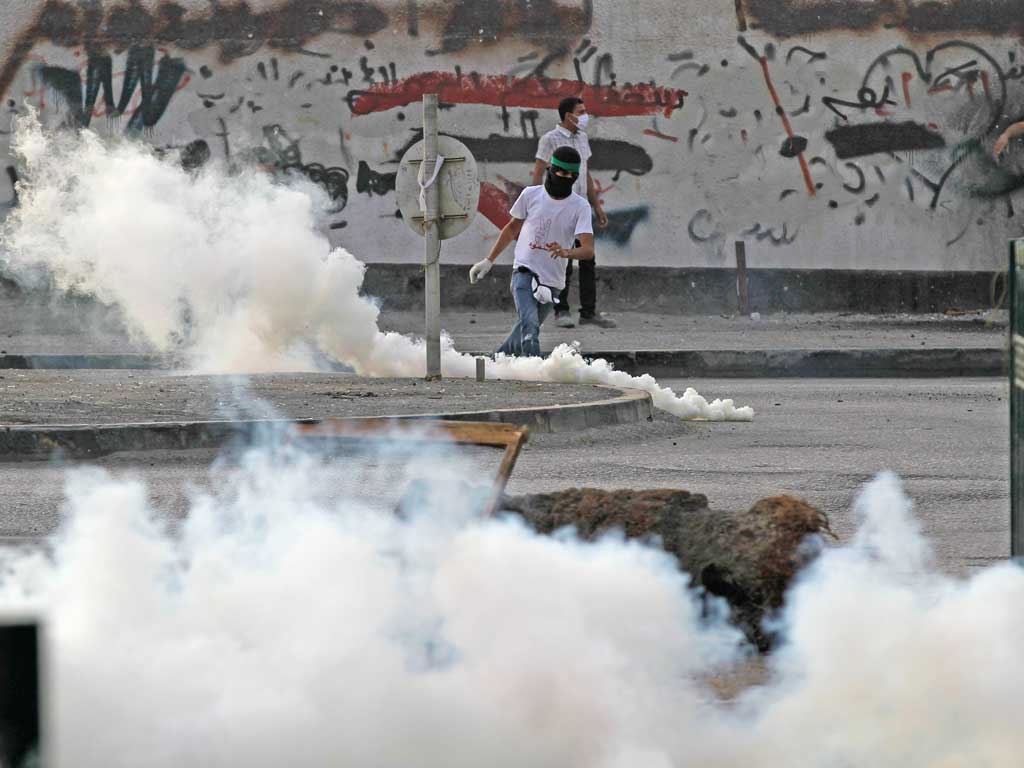Deal with Saudis to shore up Bahrain's repressive regime
Closer political union is blow to Shia protest movement

Your support helps us to tell the story
From reproductive rights to climate change to Big Tech, The Independent is on the ground when the story is developing. Whether it's investigating the financials of Elon Musk's pro-Trump PAC or producing our latest documentary, 'The A Word', which shines a light on the American women fighting for reproductive rights, we know how important it is to parse out the facts from the messaging.
At such a critical moment in US history, we need reporters on the ground. Your donation allows us to keep sending journalists to speak to both sides of the story.
The Independent is trusted by Americans across the entire political spectrum. And unlike many other quality news outlets, we choose not to lock Americans out of our reporting and analysis with paywalls. We believe quality journalism should be available to everyone, paid for by those who can afford it.
Your support makes all the difference.Bahrain and Saudi Arabia are expected to announce a closer political union at a meeting of the six Gulf monarchies today. The move is being seen by Bahrain's Shia majority as an attempt by the Sunni al-Khalifa royal family to retain their monopoly of political power.
Saudi troops leading a 1,500-strong force from the Arab Gulf states entered Bahrain in March last year as the Bahraini government began a campaign of brutal repression against pro-democracy protesters. The authorities have claimed the protests were orchestrated by Iran although both the United States and the government's own commission of inquiry have said there is no evidence of this.
The unity proposal between the two kingdoms comes as the Bahraini opposition says arrests, beatings and police violence have increased since the Formula 1 Grand Prix was staged in the island kingdom last month amid pledges of reform from the government.
Samira Rajab, Bahrain's minister of information affairs, said yesterday: "I expect there will be an announcement of [political union] of two or three countries." He said the Gulf union had been proposed by King Abdullah of Saudi Arabia but was "backed by Bahrain". In practice, the change appears to apply only to Saudi Arabia and Bahrain, which will inevitably lose a significant part of its independence to the much larger Saudi state.
Ms Rajab said "sovereignty will remain with each of the countries and they would remain as UN members, but they would unite in decisions regarding foreign relations, security, military and economy". Another top Gulf official was quoted at the end of last week as saying Gulf leaders would "discuss the idea of a union between Saudi Arabia and Bahrain".
Even discussion of a union underlines the determination of the hardline but dominant faction in the al-Khalifa family not to to compromise with the Shia majority in the population. The hardliners are led by the prime minister, Khalifa bin Salman al-Khalifa, who is close to the Saudi ruling family, has held his position for 40 years, and is supported by the powerful royal court minister and the army commander.
The opposition, meanwhile, says the crackdown on pro-democracy activists has been stepped up in recent weeks. On Saturday, protesters burned tyres and clashed with police to demand the release of opposition leaders and rights activists, one of whom has been on a three-month hunger strike.
Nabeel Rajab, until recently the most prominent and outspoken human rights leader still at liberty in Bahrain, was served with a second detention order for seven days at the weekend, accused of posting "insulting" tweets against the Interior Ministry.
The arrest of Mr Rajab is part of a pattern of increased repression in Bahrain since the Grand Prix, critics of the regime say. Abdul Jalil Khalil Ebrahim, a leader of the largest opposition party, al-Wifaq, said: "Some 200 youths have been arrested since Formula 1 and there are some 900 people now behind bars." He estimates that 400 have been given prison terms, adding that the security forces are using a particularly toxic type of tear gas and have resumed the use of buckshot, leading to deaths among protesters and bystanders.
Mr Ebrahim, who heads al-Wifaq's parliamentary bloc, which resigned in protest at last year's repression, said: "Injured people are unable to go to hospitals because they will be arrested, so they receive inadequate treatment at home."
The government is firmly in control of security, but has been unable to stop protests in Shia villages where clashes are escalating. Mr Ebrahim is convinced that "if there is no political solution an uprising will come."
Arms shipments resume after US suspension
The Obama administration is resuming some arms shipments to Bahrain after most were suspended last year because of the crackdown on dissent. The US State Department said last week that, while the administration still had human rights concerns, it was releasing the equipment because it was in the US national interest and was necessary for the defence of Bahrain, which hosts the US Navy's 5th fleet. The items being released were not used for crowd control, it added. AP
Join our commenting forum
Join thought-provoking conversations, follow other Independent readers and see their replies
Comments